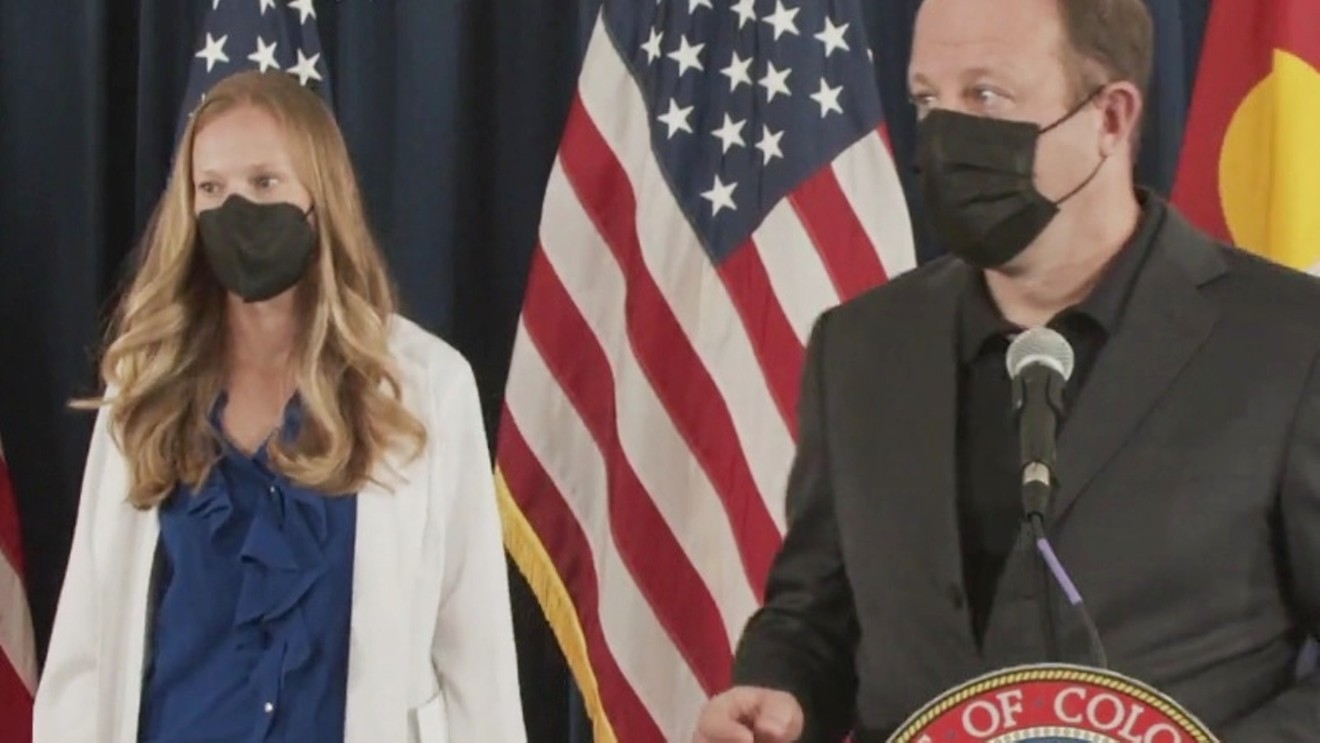Governor Jared Polis's scheduled 1 p.m. press conference about COVID-19 today, December 2, was delayed for approximately twenty minutes, and the reason was made clear in a 1:12 p.m. post on his Facebook page.
A graphic dominating the item read "BREAKING NEWS: OMICRON DETECTED IN COLORADO." Then, following a line emphasizing "Not a Time for Panic, a Time for Caution," the post quoted Polis as saying "It’s particularly critical that Coloradans heed caution and get vaccinated, get a booster dose, wear a mask in indoor public spaces, limit large gatherings, wash their hands frequently, get tested if they have symptoms or were exposed, and practice physical distancing."
Meanwhile, the Colorado Department of Public Health and Environment put out a news release about confirmation of the Omicron variant — the third such example in the United States, following detection of the mutation in California and Minnesota. The CDPHE revealed that the individual in question is an adult female from Arapahoe County who recently traveled as a tourist to southern Africa, where Omicron, or B.1.1.529, was first identified last month. She's currently experiencing minor symptoms and is isolated and recuperating at home — and while she was fully vaccinated, she had not yet received a booster shot for which she is eligible.
The health department added that the Colorado State Public Health Laboratory "conducted genome sequencing on the specimen and confirmed the presence of the Omicron variant. The specimen had the signature S gene target failure diagnostic test profile" connected to Omicron. The World Health Organization has designated it as a variant of concern.
Polis and Colorado lead epidemiologist Dr. Rachel Herlihy went over these facts and added more details. For instance, Herlihy revealed that the infected woman visited multiple countries in Africa and returned to the U.S. through Denver International Airport late last week. The patient wasn't ill upon her arrival but developed symptoms over the next day or so. After she tested positive for COVID-19, her case was flagged because of her travel history. Herlihy added that the woman wore masks during her flights and, thus far, none of her close contacts has tested positive.
For his part, Polis stressed that there's much we don't know about the Omicron variant, including whether it's more transmissible than either the original strain of the disease or the Delta variant (though there are early indications that it can spread quickly); if it causes fewer, more or a similar number of severe cases; and the level of effectiveness of vaccines against it. He predicted that scientists will have a better grasp on the possibilities in "weeks, not months."
At present, hospitalizations appear to be trending down in Colorado from the latest peak. There are currently 1,400 people hospitalized with COVID in the state, and 1,152 of them, or roughly 82 percent, are unvaccinated. The critical shortage of intensive-care unit beds has eased a bit, but Polis acknowledged that the situation remains concerning.
After encouraging people to get vaccinated or boosted and talking up the easy availability of shots (Ball Arena will be making them available at a range of events), as well as pitching the effectiveness of monoclonal antibody treatments, Polis invited questions. During this session, he and Herlihy both praised the Tri-County Health Department, which took the lead on identifying the variant, and noted that based on an analysis of wastewater, Omicron doesn't appear to be spreading at a community level in Colorado.
Yet.
[
{
"name": "Air - MediumRectangle - Inline Content - Mobile Display Size",
"component": "12017618",
"insertPoint": "2",
"requiredCountToDisplay": "2"
},{
"name": "Editor Picks",
"component": "17242653",
"insertPoint": "4",
"requiredCountToDisplay": "1"
},{
"name": "Inline Links",
"component": "18838239",
"insertPoint": "8th",
"startingPoint": 8,
"requiredCountToDisplay": "7",
"maxInsertions": 25
},{
"name": "Air - MediumRectangle - Combo - Inline Content",
"component": "17261320",
"insertPoint": "8th",
"startingPoint": 8,
"requiredCountToDisplay": "7",
"maxInsertions": 25
},{
"name": "Inline Links",
"component": "18838239",
"insertPoint": "8th",
"startingPoint": 12,
"requiredCountToDisplay": "11",
"maxInsertions": 25
},{
"name": "Air - Leaderboard Tower - Combo - Inline Content",
"component": "17261321",
"insertPoint": "8th",
"startingPoint": 12,
"requiredCountToDisplay": "11",
"maxInsertions": 25
}
]












